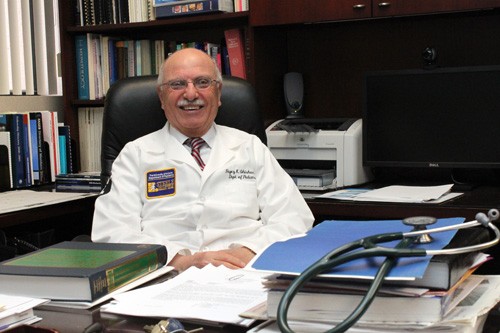A UA research team recently made a novel finding which linked chronic inflammatory disease to premature aging.
Inflammatory bowel disease affects 1.5 million people in the U.S. alone, according to Dr. Fayez K. Ghishan, head of the Department of Pediatrics and director of the Steele Children’s Research Center at the UA.
People with inflammatory bowel diseases suffer from gastrointestinal symptoms such as abdominal pain, diarrhea and, in children, stunted growth. Between 40 and 50 percent of these patients also suffer from osteoporosis and osteopenia, which stems from calcium and phosphate deficiencies, Ghishan said.
“”The question is ‘why?'”” Ghishan said.
Ghishan and his associates believe they may have found an answer in a gene called Klotho. The Klotho gene plays a role in aging and vitamin D metabolism, Ghishan explained.
The gene is named after an ancient Greek goddess who spun the thread of life and was responsible for determining how long people lived.
“”Our hypothesis is (that) in patients with chronic inflammation, Klotho (is) inhibited; there is less of it,”” said Pawel Kiela, a UA research associate professor who works with Ghishan.
Ghishan added that if the gene is knocked down, a person will begin aging and will develop osteopenia and osteoporosis.
The Klotho gene is represented in three places throughout the body, all of which play a role in calcium regulation. In the absence of this gene, too much calcium is lost in urine and bone density decreases.
“”When you lose calcium in urine, or don’t get enough from your diet, you end up leeching it from the bone,”” Kiela said.
This new discovery will change textbooks and allow doctors to better understand inflammatory bowel disease.
“”The fact that such a pathway exists may help us explain a lot of the problems that patients with (these) conditions develop,”” Kiela said.
Ghishan said that although common knowledge would suggest using vitamin D and calcium to counteract bone loss in chronic inflammation, he thinks that’s a bad idea.
“”We think that in order to prevent osteoporosis in these patients, you first have to control the inflammation, and only when Klotho goes back up, you can introduce vitamin D supplementation,”” he said.








